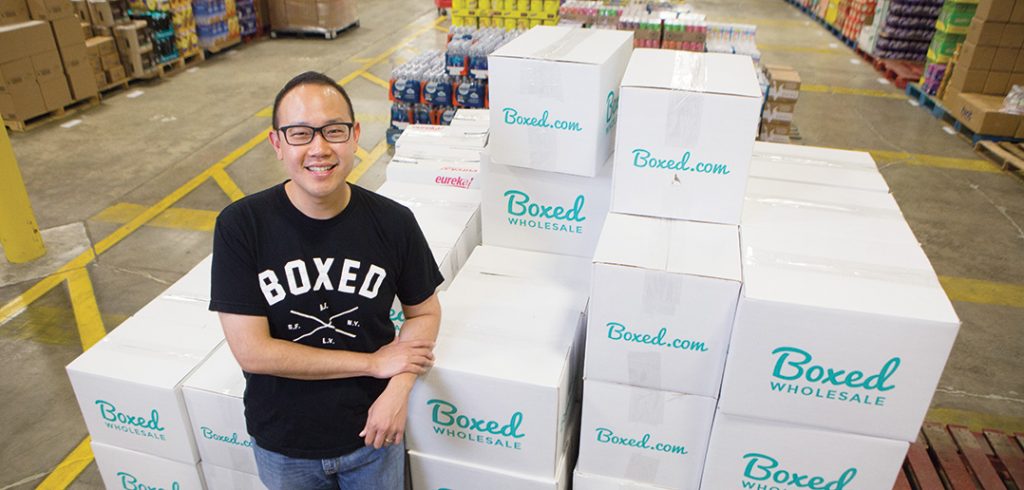Chieh Huang, LAW ’08, has never taken the easy road. As the only son of a low-income immigrant family, he worked and borrowed his way through college. After two years in corporate law, he jumped into mobile gaming in its infancy. Now he’s taking on the $25 billion warehouse retail industry.
Since its founding in 2013, his online bulk-shopping service Boxed has raised $26 million, hired nearly 70 full-time employees, and opened three shipping centers, which can deliver Costco-style value packs of anything from cereal to toilet paper anywhere in the lower 48 states within two days. And earlier this year, Huang announced an ambitious plan to fund college tuition for his employees’ children.
What inspired you to guarantee college tuition for children of your full-time staff?
My undergraduate tuition at Johns Hopkins was paid partially by financial aid but also through the generosity of my mom’s employer. They gave me a huge scholarship. I guess they saw something in me.
And now you want to give the same opportunity to your employees?
Absolutely. I look at the folks in our warehouses and see that some of them can’t even afford a car. How are they ever going to get above that level? My parents were able to fight their way through hard work and a stroke of luck. But if that luck never strikes, there could be generations stuck at that level. I thought, “Why not give these folks that upward mobility that I achieved?”
How are you funding the program?
We have cash to cover the short-term obligations, and then the longer-term funds are tied up in my personal stock in the company. If Boxed does well, there’s enough to pay a lot of tuition. If Boxed doesn’t do well, the program won’t work. It’s kind of a motivation cycle that feeds into itself.
So it’s about leveling the playing field, correcting injustices. Is that at all why you chose to go to Fordham Law?
I always had a passion for the law, but as a kid I was more reacting to injustice. I could tell, even as a child, that my parents were having a difficult time with simple things, like getting a driver’s license. I still remember one vivid moment: The DMV rejected my mother’s signature [they couldn’t read her handwriting]. As I got older, I realized there’s some screwed up stuff going on in the world, and so that was the genesis of me being an attorney.
Why’d you go into tech?
I saw the rise of Facebook and mobile gaming upstarts like Zynga. I also had one of the first iPhones. I thought, “These things are only going to get more powerful.” We started Astro Ape Studios, and things really took off. Within a couple of years, Zynga bought the company, using us as their New York office.
How did you make the transition from gaming to online retailing?
The most sophistication and knowledge on mobile is concentrated in gaming. We were at the forefront of knowing how user behavior works, how user acquisition works, how to make a great experience. So why not go after the largest prize we could find? The consumer bulk-shopping industry is a significant driver of the economy, but only 1.5 percent of it exists online.
It’s fairly far from where you started. Is your law degree still useful?
Fordham has a pretty liberal study abroad policy, so my first summer we went to Korea, and I worked at Samsung in a business capacity. I really was exposed to both sides of the table. My training as an attorney helps me know what I don’t know, which is just as important as knowing something myself. If you don’t have legal training, either you need an expert for everything or you think nothing is dangerous, which can really screw you later on.
Interview conducted, edited, and condensed by Corinne Iozzio, FCLC ’05.

